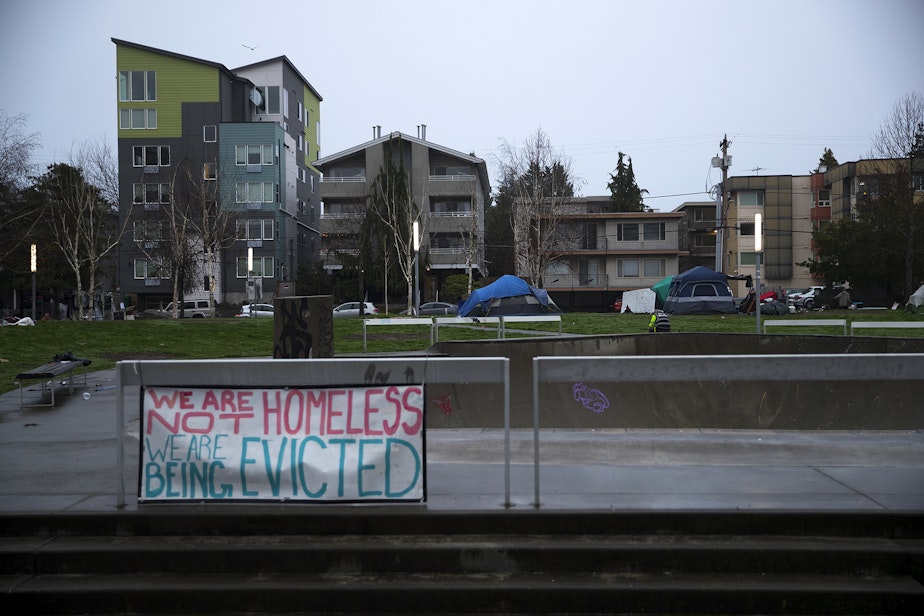A failed hotel shelter program left nearly 300 people scrambling for housing. Who’s to blame?

With the help of a $1 million FEMA grant, the Lived Experience Coalition, a group advocating for policy solutions to homelessness, rolled out a program last winter that worked directly with unhoused people. The program moved them into four hotel shelters across King County and Tacoma.
But shortly after its launch, the program ran into financial trouble: The Lived Experience Coalition overspent by nearly $1 million, according to an independent audit funded by local philanthropic organizations, and ultimately collapsed, leaving residents of those hotels in limbo.
The audit, for which a draft report was released last week, found that the Lived Experience Coalition should never have received federal money in the first place, and found that mistrust and poor communication between the organization and its partners led to its demise.
“This wasn't something where they went back through the books and had accountants check line by line,” explained Seattle Times Project Homeless reporter Anna Patrick, who wrote about the report. “[The auditor] came in and really asked all of the key stakeholders a lot of questions.”
It’s unclear how many people benefited from the Lived Experience Coalition’s hotel shelter program before its fall. But in April, at the time the King County Regional Homelessness Authority stepped in, there were 285 people living across four hotels.
Sponsored
When the program shuttered, about 122 people were moved into another form of shelter that wasn’t permanent housing, Patrick said, including treatment centers, hospitals, or even jail. Fifty-three people were moved into permanent housing, and the rest returned to either living on the street or with relatives, or their status is otherwise unknown.
According to the draft audit, there’s enough blame to go around regarding the program’s failure.
“What we see is a few key stakeholders who were involved are partly to blame,” Patrick said. “We see breakdowns across the Lived Experience Coalition, as well as their fiscal sponsor…Building Changes, that works on homelessness across the state. And then we also see, in addition to these two groups being partly to blame, the King County Regional Homelessness Authority mentioned.”
But according to the draft report, the Lived Experience Coalition is the most culpable for its fate.
“Ultimately, what [the auditor] writes is that the Lived Experience Coalition is a group with autonomy that can and did make this decision on their own, thoughtfully and deliberately; they are now experiencing the consequences of those decisions,” Patrick said.
Sponsored
The draft report also cites “personalities” and expedited timelines as contributing factors to the breakdown.
“It's very clear in this report that the Lived Experience Coalition had a different set of goals than how the King County Regional Homelessness Authority typically operates,” Patrick explained. “The Lived Experience Coalition thought it was valuable and important to bring people inside temporarily, whereas the Regional Homelessness Authority generally believes that the ultimate goal is housing.”
The report also points to tension existing between the various parties even before the shelter program got off the ground, Patrick added. But following the release of the draft report, the organizations issued a unified response.
“Ultimately, their message was sort of like, ‘We need to work together on this,’” Patrick said. In a joint statement, the Lived Experience Coalition, Building Changes, and United Way of King County, which administered the FEMA funding, said, “We do not believe it to be productive to litigate the findings of this report nor resurface prior grievances regarding the actions or inactions that led to it.”
That statement struck a different tone than the dialogue leading up to the draft report's release, Patrick said.
Sponsored
“Before this report came out last week…there was an immense amount of finger-pointing," she said. "Many groups were sort of saying, ‘It's not my fault,’ or, ‘We did our best and you'll see the truth when it comes out.’”
So why was an advocacy organization, with no prior experience running a hotel shelter program, even given a chance to squander so much federal money?
“That is a question that I am still looking into,” Patrick said. “And to be honest with you, it's not a question [for which] I've had really any simple answers back.
“This independent auditor even writes that the funding that the Lived Experience Coalition received…came from FEMA’s Emergency Food and Shelter program, and that money is really designed for existing programs. And she writes in her report that, literally, the coalition should have never received this kind of money to begin with, because this was a brand new program coming out of thin air.”
A final report is expected to be released sometime in September.



